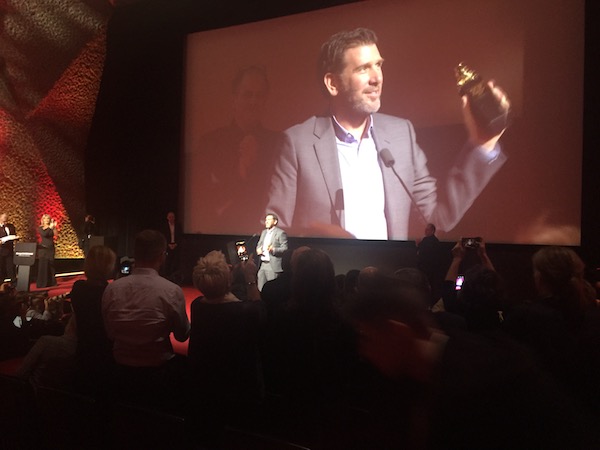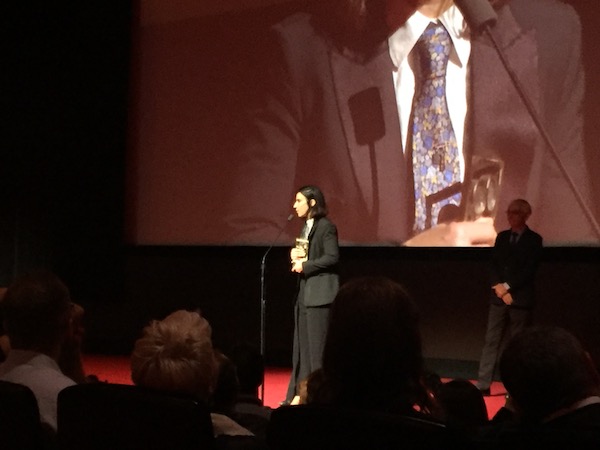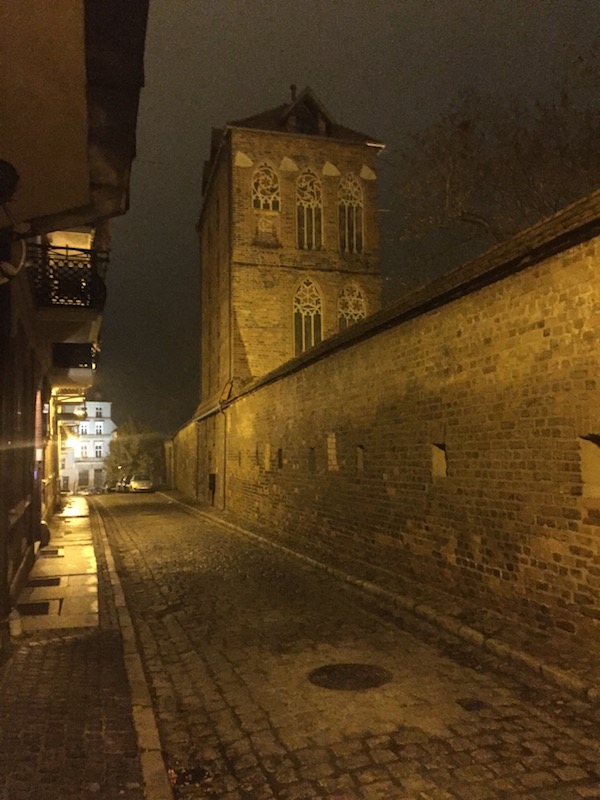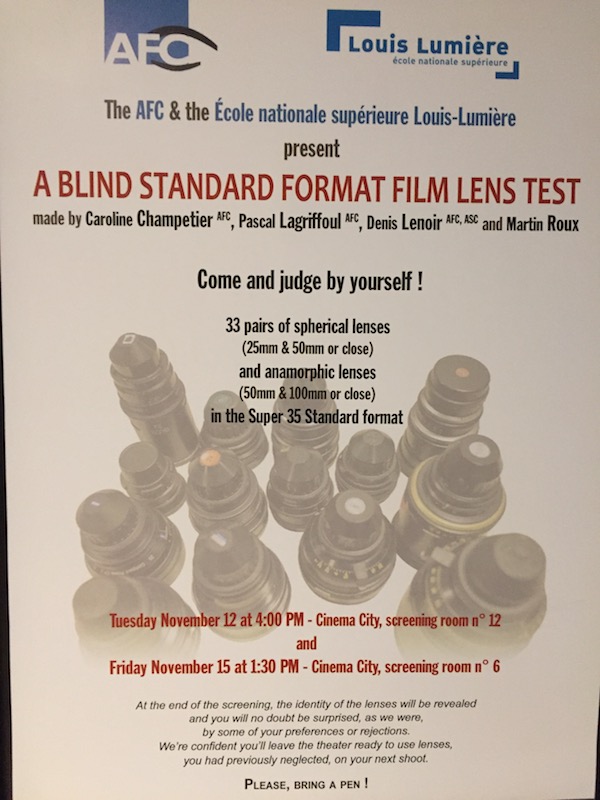
The 27th EnergaCAMERIMAGE festival closed Saturday, November 16, in Toruń, Poland. It was the first time the festival was staged in Toruń in several years, and the adjustment was not always a smooth one. But the consensus among guests and attendees was that this was another rousing success for artistic director Marek Żydowicz and his staff.
Awards were handed out in several competitive categories. Lawrence Sher, DP for Todd Phillips’ Joker, won both the Gold Frog for best cinematography and the audience favorite award. This was the first Camerimage for Sher, who participated on seminars, panels, and juries, and who went out of his way to make himself available to fans. Sher hosted a presentation on his Shotdeck software program and also dropped in on several other talks.
The Silver Frog went to César Charlone for The Two Popes, directed by his long-time collaborator Fernando Meirelles. The Bronze Frog was awarded to Vladimír Smutný for Václav Marhoul’s adaptation of the Jerzy Kosiński novel The Painted Bird.

DP Laura Mierans and director Paxton Winters both won debut awards for their work on Pacified, continuing a streak that started at the San Sebastian Film Festival. This heartfelt, deeply moving film is destined for more success in the future.
During the closing night ceremonies, special awards were given to Richard Gere, Edward Norton, and the duo of DP Robert Richardson and director Quentin Tarantino. Gere then presented John Bailey with a Lifetime Achievement Award. Bailey, who was honored with a series of retrospective screenings (including American Gigolo, In the Line of Fire, and Mariette in Ecstasy), delivered a touching tribute to his wife, the noted editor Carol Littleton, describing their instant attraction during their first encounter in Florence.
This year’s venues included the CKK Jordanki, where the main screenings took place. It was also the site of the marketplace, a hallway filled with vendors; a room for post-screening Q&As; and interview rooms. Documentaries were shown at the Horzyca Theatre, an intimate jewel box built in 1904. Most other screenings took place at the City Cinema multiplex. Fewer tickets were available this year, and the new app-connected reservation system hit some speed bumps. Add the Poles’ general aversion to lines, and getting inside a screening on time, or at all, became a week-long battle.

A UNESCO World Heritage site, Toruń is distinguished by its world-class medieval architecture, mostly concentrated in a traffic-free city center perfect for strolling. With venues and hotels clustered fairly close, it was easy to walk to every event.
Camerimage is famous for its parties, hosted by industry heavyweights like Panavision, Canon, Fuji, and Hawk. But what really sets the festival apart is its openness. Students and fans can mingle with DPs and directors before and after screenings, as well as seminars and master classes. They can also see and try the latest equipment, from filters to rigs, lights, cranes, lenses, and cameras.
To be honest, there was some grumbling from veterans and newcomers alike about some of the festival’s selections. Many felt the competitive slates were too Eurocentric, with little attention paid to world cinema. Zhang Yimou’s Shadow was in competition, and its DP Zhao Xiaoding spoke openly about production troubles and the fate of Zhang’s One Second, pulled this spring from the Berlin International Film Festival. But Parasite was shunted to a Saturday afternoon screening at the seldom-visited Centre of Contemporary Art.
Other issues were raised at the annual diversity panel, this year introduced by the Estonian cinematographer Elen Lotman. Panelists Virginie Surdej, Ed Lachman, Ula Pontikos, Natasha Braier, Bradford Young, and Nina Kellgren discussed everything from gender and racial inequality to deciding whether to work within the system or not.
Benjamin B moderated a panel celebrating the centennial of the American Society of Cinematographers. Also speaking were John Bailey, Caleb Deschanel, Roberto Schaefer, Robert Yeoman, and American Cinematographer executive editor Stephen Pizzello. Hearing Bailey and Deschanel discuss the merits of Rear Window was a treat that could happen nowhere else. Everyone agreed that Sunrise, featured in opening clips, deserved an entire session to itself.
Vittorio Storaro, Dante Spinotti, Ed Lachman, and Rodrigo Prieto were among the many celebrated DPs to host seminars and master classes. An unexpectedly engrossing talk covered the cinematic influences and techniques in Pixar’s Toy Story 4, with DP Patrick Lin explaining how the direction Woody took on screen mirrored his psychological moods, and lighting technical director Ye Won Cho going into exquisite detail about the thousands of props and light sources she had to plan for.

Another fascinating session was hosted by Denis Lenoir for the AFC & Ecole Nationale Louis Lumiere: a blind format test that compared 33 paired lenses shooting the same two shots. It was constructed so viewers could judge a gratifyingly wide range of lens properties and effects, from focus to flare. As Lenoir promised, the results were often surprising.
Another surprise was Chris Doyle, who hosted three separate seminars while undermining proprieties on a daily basis. Showing clips, questioning panelists, taking questions from attendees, Doyle tried to delve into the thinking and motivation behind cinematographers’ choices. He was also visited by director Li-Yue Chang, who drove from England with his mother to meet with Doyle, the cinematographer of his short To Heaven, To Gather.
Screenings stretched from ten in the morning to well after midnight. (My interview with Ford v Ferrari DP Phedon Papamichael was optimistically scheduled for 12:30 a.m.) Since each film was shown only once, it was impossible to see everything. The same with seminars: watch Rodrigo Prieto talk about Zeiss lenses, miss Ed Lachman on the challenges of new technology, and the Toy Story 4 presentation. You’re also missing Joker, the documentary Katka, and It: Chapter Two.
The unfailingly polite and enthusiastic staff helped overcome some of the frustrations that are of course endemic to film festivals everywhere. I especially appreciate the help from Festival Office Manager Kazik Suwala, Darek Kuzma, Justyna Czarna, Marcelina Żydowicz, Marlena Gabryszewska, Natalia Czerwinska, Kamil Horodecki, and Maria Staniszewska.
Complete list of winners:
MAIN COMPETITION
Golden Frog: Joker, cin. Lawrence Sher, dir. Todd Phillips
Silver Frog: The Two Popes, cin. César Charlone, dir. Fernando Meirelles
Bronze Frog: The Painted Bird, cin. Vladimír Smutný, dir. Václav Marhoul
FIPRESCI AWARD
The International Critics Prize to the director of the best film in the Main Competition – under specific consideration of its cinematography: The Painted Bird, cin. Vladimír Smutný, dir. Václav Marhoul
AUDIENCE AWARD
Camerimage Audience Award: Joker, cin. Lawrence Sher, dir. Todd Phillips
POLISH FILMS COMPETITION
Best Polish Film: Mister T., cin. Artur Bajerski, dir. Marcin Krzyształowicz
STUDENT ETUDES COMPETITION
Laszlo Kovacs Student Award – Golden Tadpole – Lefty/Righty, cin. Alfonso Herrera Salcedo, dir. Max Walker-Silverman, school: NYU – Tisch School of the Arts
Silver Tadpole: Mariam and Natan, cin. David Bajerski, dir. David Bajerski, school: Łódź Film School
Bronze Tadpole: The Last Children in Paradise, cin. Felix Pflieger, dir. Anna Roller, school: HFF München – Hochschule für Fernsehen und Film
DOCUMENTARY FEATURES COMPETITION
Golden Frog — best documentary feature: Midnight Family, cin. Luke Lorentzen, dir. Luke Lorentzen
Golden Frog — best docudrama: Marek Edelman… and There Was Love in the Ghetto, cin. Jakub Kijowski, Jolanta Dylewska,dir. Jolanta Dylewska
DOCUMENTARY SHORTS COMPETITION
Golden Frog — Grand Prix: Kamali, cin. Jake Gabbay, dir. Sasha Rainbow
Special Mention: Oneself, cin. Christiaan van Leeuwen, dir. Carolien van Maaswaal
DIRECTORS’ DEBUTS COMPETITION, under the patronage of the Polish Filmmakers Association (SFP)
Best Director’s Debut: Pacified, cin. Laura Merians, dir. Paxton Winters
CINEMATOGRAPHERS’ DEBUTS COMPETITION, under the patronage of the Polish Filmmakers Association (SFP)
Best Cinematographer’s Debut: Pacified, cin. Laura Merians, dir. Paxton Winters
MUSIC VIDEOS COMPETITION
Best Music Video: James Massiah “Natural Born Killer (Ride for Me)”, cin. Mauro Chiarello, dir. Ian Pons Jewell
Best Cinematography In A Music Video: Jon Hopkins “Singularity,” cin. Khalid Mohtaseb, dir. Seb Edwards
FIRST LOOK – TV PILOTS COMPETITION
Best Pilot: Euphoria, cin. Marcell Rév, dir. Augustine Frizzell


